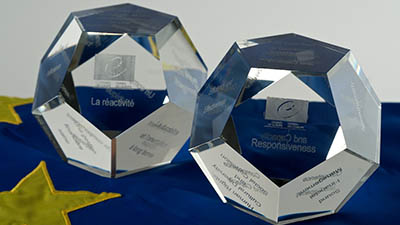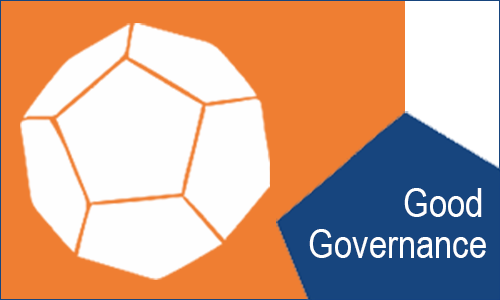The European Label of Governance Excellence (ELoGE)

The procedure for ELoGE is set out in its Regulations. It consists of the following stages:
 Accreditation
Accreditation
ELoGE relies on a partnership between the Council of Europe and an existing reputable regional, national or transnational entity or an ad hoc platform with a substantive know-how, expertise or experience in the field of good governance, especially at the local level.
Such entities or platforms can request accreditation to implement ELoGE. If the Council of Europe agrees that they meet accreditation criteria, the entities concerned are given the responsibility to implement ELoGE with municipalities of a given region or country.
The ELoGE Accreditation Platform of the Strategy for Innovation and Governance at Local Level is the Council of Europe body in charge of examining accreditation requests.
Composition: It is composed of the Bureau of the European Committee on Democracy and Governance (CDDG) and 2 representatives of the Conference of International Non-Governmental Organisations (CINGO). Representatives of the Congress of Local and Regional Authorities and the Parliamentary Assembly of the Council of Europe can also participate in its work.
Meeting reports
4th meeting, meeting by videoconference, 24 March 2020
Report
5th meeting, meeting by videoconference, 29 March 2021
6th meeting, hybrid meeting, 15 October 2021
Report
7th meeting, hybrid meeting, 25 March 2022
Report
8th meeting, Strasbourg, 24 March 2023
9th meeting, Strasbourg, 20 October 2023
 Implementation
Implementation
The accredited entity commits to implementing ELoGE in a meaningful number of municipalities by a given deadline. This means translating the benchmark, making necessary adaptations, identifying the municipalities who wish to implement ELoGE and helping them undertake the different steps of ELoGE. These steps include: a self-evaluation, a citizens’ survey and a questionnaire addressed to elected officials, all aimed at assessing where municipalities stand as regards compliance with the 12 Principles of Good Democratic Governance.
The Centre of Expertise for Good Governance can support the implementation of ELoGE by providing guidance, advice and training. In some circumstances, it can also provide financial support.
 Award
Award
The accredited entity awards ELoGE to deserving municipalities that have successfully completed ELoGE. This label, which is valid for one year, is a recognition that a municipality has achieved a high level of good governance according to Council of Europe standards. Far from being the end of a process, ELoGE is also an instrument for municipalities to understand their strengths and weaknesses and to initiate action with a view to addressing the latter.
The Centre of Expertise for Good Governance stands ready to follow up the results of ELoGE, making available its tools aimed at strengthening governance and proposing targeted cooperation activities.
Second Round of ELoGE in Lithuania: Renewed Commitment to Good Democratic Governance
Promoting Governance Excellence at all level levels of decentralised government in Romania
ELoGE Study Visit: exchanges between the Slovak and Italian municipalities
“ELoGE is our guide in the service of our public” - 2nd Cycle of ELoGE Awards, France
Award Ceremony concluding the first round of ELoGE in the Region of Murcia
ELoGE Conference in Romania: Municipalities Commit to Strengthen Good Democratic Governance
Good Democratic Governance – launch event for new cycle of ELoGE in France
How do you promote effective democracy and good governance at all levels in Romania? Launch ELoGE!
Tutte le strade portano a ELoGE: the importance of good democratic governance in Italy
Measuring democratic governance by European standards: ELoGE launch event in Pristina




